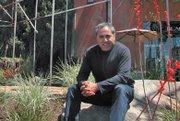The Lab Anti-Mall Shifts Course
More than 10 years ago, Shaheen Sadeghi opened Costa Mesa, Calif.–based The Lab as the Generation X antidote to the traditional mall. With Generation X approaching middle age, the 49-year-old Sadeghi has taken steps to ensure his alternative will still matter.
A subtle changing of the guard is happening at the 3.5-acre experimental shopping center, which is more than one mile south of the upscale South Coast Plaza. Higher-end boutiques with a youthful, independent flair are moving in. Many of the stores made for the initial demographic, the alternativerock set, are moving out.
The change is most apparent in suite A107, the address of punk clubwear boutique Electric Chair. The company did not renew its lease, and its neighbor, the high-end contemporary boutique Habit, plans to expand into the space in June. The move will double Habit’s space from 1,100 square feet to 2,300 square feet.
Habit is not alone. Carve, a boutique specializing in European leather goods and designer clothes, will open in late April. It joins Blends, a high-end sneaker shop that opened six months ago, and Black & Blue, a boutique with denim retailing for $80 to $250 that debuted in November 2002.
Black & Blue co-owner Jody Gabbard said bringing higher-end clothes to The Lab was as much of an experiment as the original concept of the shopping center.
“We knew going into this that The Lab wasn’t drawing in our customers,” Gabbard said. “But we’re optimistic. Orange County people are ready for this store and concept.”
Jegrave;nelle Meyer, co-owner of Habit, said local consumer tastes and the market for denim are driving an embrace of higher-end shops.
“The demographic is not going to be as fast as New York, but the price threshold and the fashion threshold is moving up,” Meyer said. “Denim has gotten so huge, it’s driven up the price. If the consumer wants it, they have to pay for it.”
Habit stocks high-end denim lines, including Diesel, Gsus, Hudson and James. The high denim prices have driven up price points 40 percent in the store since 2000, Meyer said.
Sadeghi agreed The Lab is changing, but he maintains the shopping center will stay true to its alternative roots. The center’s anchor, Urban Outfitters, a purveyor of youthful alternative sportswear and home supplies, has been a tenant since The Lab opened. The Philadelphia-based chain signed a 10-year lease with the shopping center in 2003. The Lab store has been a good performer; in 2003, sales increased $1 million over the previous year.
The 12,000-square-foot Urban Outfitters is one of the four original tenants still doing business at The Lab—and the only apparel store left of those early tenants. Five of the 14 other businesses at The Lab sell clothes.
Sadeghi said there is currently no vacancy at the shopping center, where sales per square foot range from $470 to $1,100.
The Lab has not suffered an unprofitable year, according to Sadeghi, who would not disclose earnings for the privately held company.
The shoppers interviewed for this story said The Lab’s mix of retail has never become stale.
“It’s staying avant-garde. They sell clothes from a lot of up-and-coming designers that you don’t see at the mall,” said Cindy Min, a 27-year-old Los Angeles resident who’s been shopping at The Lab since it opened. “It is getting a little chi-chi. But they still have Urban Outfitters. So it’s a great mix.”
Analysts following The Lab said they believe it will remain profitable and even an inspiration to retailers in the near future.
“It’s been quietly influential,” said Miriam Meglan, a hedge fund manager and former retail analyst from Frederick, Md. “Sadeghi has built the ultimate gourmet lifestyle center, and as real estate opportunities become less available and people have to go back and redevelop extra projects, we’re going to see more of this kind of thing.”
Nontraditional urban renovation
Sadeghi took a nontraditional path to running a shopping center. He grew up in Michigan, was educated at the Pratt Institute of Art and Design in New York, and once earned his paychecks by working as the president of Quiksilver Inc. and the executive vice president of Gotcha.
He changed careers in the early 1990s because he felt retailers were losing touch with young people, a trend that he felt became apparent with the closing and consolidation of major department stores such as Buffums and Bullocks.
With no majority partners or investors looking over his shoulder, Sadeghi has been free to expand his vision. In 2002, he opened The Camp, a 4-acre open-air shopping center across the street from The Lab. Built for outdoors enthusiasts, The Camp features apparel specialty stores such as Billabong, camping apparel store Patagonia and vegan restaurant Native Foods.
Last week, Sadeghi purchased Shooters, a 5,500-square-foot sports bar abutting The Camp, for an undisclosed amount. He plans to turn the space into a new eatery and expand the grounds of the shopping center.
The purchase also dovetails into his ultimate goal: transforming the 10 acres owned by Lab Holdings LLC, which oversees The Lab and The Camp, into what he calls SoBECA, an acronym for “South on Bristol Entertainment Culture and Arts.”
Sadeghi plans for SoBECA to be a mixeduse compound, bringing together artists’ lofts, parks, restaurants and specialty retailers. He hopes to bring about that vision by working with the Costa Mesa City Hall and through the Bristol Street Mixed-Use Overlay Committee, a business group that he leads.
Sadeghi guaranteed the development will remain anchored in retail.
“This business is half in real estate, half in fashion,” Sadeghi said of the shopping centers. “To be successful, ultimately you have to think like a merchant, and we are merchants.”






















